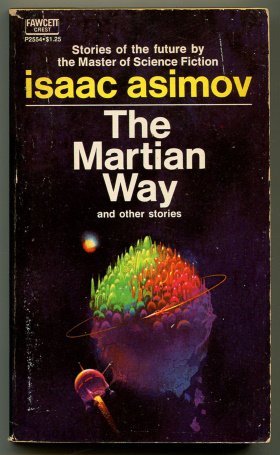1-G. Bannerd news report, datelined Cepheus 18, 201/977 G.E.
2-G. Bannerd news report, datelined Cepheus 18, 203/977 G.E.
1. The sterility of non-Humans on Cepheus 18, reported to the BuOuProv in reference (a), has become the subject of news reports to the galactic press. The news reports in question are submitted herewith for the information of the BuOuProv as Enclosures 1 and 2. Although said reports are based on material considered confidential and closed to the public, the news reporter in question maintained his rights to free expression under the terms of reference (b).
2. In view of the unavoidable publicity and misunderstanding on the part of the general public now inevitable, it is requested that the BuOuProv direct future policy on the problem of non-Human sterility.
L. Antyok, Superv. AdHQ-Ceph18,
209/977 G.E.
From: BuOuProv
To: AdHQ-Ceph18
Subject: Birth rate of non-Humans on Cepheus 18, Investigation of.
References:
(a) AdHQ-Cephl8 letr. AA-LNmn, dated 209/977 G.E.
(b) AdHQ-Ceph18 letr. AA-LNmn, dated 174/977 G.E.
1. It is proposed to investigate the causes and the means of precluding the unfavorable birth-rate phenomena mentioned in references (a) and (b). A project is therefore set up, entitled, ‘Birth rate of non-Humans on Cepheus 18, Investigation of’ to which, in view of the crucial importance of the subject, a priority of AA is given.
2. The number assigned to the subject project is 2910, and all expenses incidental to it shall be assigned to Appropriation number 18/78.
C. Morily, Chief, BuOuProv,
223/977 G.E.
III
If Tomor Zammo’s ill-humor lessened within the grounds of Sci-Group 10 Experimental Station, his friendliness had not thereby increased. Antyok found himself standing alone at the viewing window into the main field laboratory.
The main field laboratory was a broad court set at the environmental conditions of Cepheus 18 itself for the discomfort of the experimenters and the convenience of the experimentees. Through the burning sand, and the dry, oxygen-rich air, there sparkled the hard brilliance of hot, white sunlight. And under the blaze, the brick-red non-Humans, wrinkled of skin and wiry of build, huddled in their squatting positions of ease, by ones and twos.
Zammo emerged from the laboratory. He paused to drink water thirstily. He looked up, moisture gleaming on his upper lip, ‘Like to step in there?’
Antyok shook his head definitely, ‘No, thank you. What’s the temperature right now?’
‘A hundred twenty, if there were shade. And they complain of the cold. It’s drinking time now. Want to watch them drink?’
A spray of water shot upward from the fountain in the center of the court, and the little alien figures swayed to their feet and hopped eagerly forward in a queer, springy half-run. They milled about the water, jostling one another. The centers of their faces were suddenly disfigured by the projection of a long and flexible fleshy tube, which thrust forward into the spray and was with drawn dripping.
It continued for long minutes. The bodies swelled and the wrinkles disappeared. They retreated slowly, backing away, with the drinking tube flicking in and out, before receding finally into a pink, wrinkled mass above a wide, lipless mouth. They went to sleep in groups in the shaded angles, plump and sated.
‘Animals!’ said Zammo, with contempt.
‘How often do they drink?’ asked Antyok.
‘As often as they want. They can go a week if they have to. We water them every day. They store it under their skin. They eat in the evenings. Vegetarians, you know.’
Antyok smiled chubbily, ‘It’s nice to get a bit of firsthand information occasionally. Can’t read reports all the time.’
‘Yes?’ – noncommittally. Then, ‘What’s new? What about the lacypants boys on Trantor?’
Antyok shrugged dubiously, ‘You can’t get the Bureau to commit itself, unfortunately. With the Emperor sympathetic to the Aurelionists, humanitarianism is the order of the day. You know that.’
There was a pause in which the administrator chewed his lip uncertainly. ‘But there’s this birth-rate problem now. It’s finally been assigned to AdHQ, you know – and double A priority, too.’
Zammo muttered wordlessly.
Antyok said, ‘You may not realize it, but that project will now take precedence over all other work proceeding on Cepheus 18. It’s important.’
He turned back to the viewing window and said thoughtfully with a bald lack of preamble. ‘Do you think those creatures might be unhappy?’
‘Unhappy!’ The word was an explosion.
‘Well, then,’ Antyok corrected hastily, ‘maladjusted. You understand? It’s difficult to adjust an environment to a race we know so little of.’
‘Say – did you ever see the world we took them from?’
‘I’ve read the reports—’
‘Reports!’ – infinite contempt. ‘I’ve seen it. This may look like desert out there to you, but it’s a watery paradise to those devils. They have all the food and water they can get. They have a world to themselves with vegetation and natural water flow, instead of a lump of silica and granite where fungi were force-grown in caves and water had to be steamed out of gypsum rock. In ten years, they would have been dead to the last beast, and we saved them. Unhappy? Ga-a-ah, if they are, they haven’t the decency of most animals.’
‘Well, perhaps. Yet I have a notion.’

























